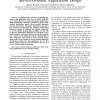Free Online Productivity Tools
i2Speak
i2Symbol
i2OCR
iTex2Img
iWeb2Print
iWeb2Shot
i2Type
iPdf2Split
iPdf2Merge
i2Bopomofo
i2Arabic
i2Style
i2Image
i2PDF
iLatex2Rtf
Sci2ools
JSW
2006
2006
Towards a Mathematical Foundation for Service-Oriented Applications Design
Abstract-- Leveraging service oriented programming paradigm would significantly affect the way people build software systems. However, to achieve this goal a solid software design methodology should be grounded on proper mathematical foundations, specific service-oriented principles, concepts and patterns. This paper contributes to the above goal proposing a lightweight, but complete, mathematical framework capable of capturing the essential components of service-oriented programming paradigm. To this end, we propose mathematical definitions for individual service, service-oriented environment and service-oriented application. Analysis of the properties and the functionalities of these components with respect to data processing mechanisms enables us to introduce a service-oriented application classification schema. For each application class we first identify specific properties and then discuss their use in a service-oriented design methodology.
JSW 2006 | Service-oriented Application | Service-oriented Programming Paradigm | Specific Service-oriented Principles |
| Added | 13 Dec 2010 |
| Updated | 13 Dec 2010 |
| Type | Journal |
| Year | 2006 |
| Where | JSW |
| Authors | Aliaksei Yanchuk, Alexander Ivanyukovich, Maurizio Marchese |
Comments (0)

